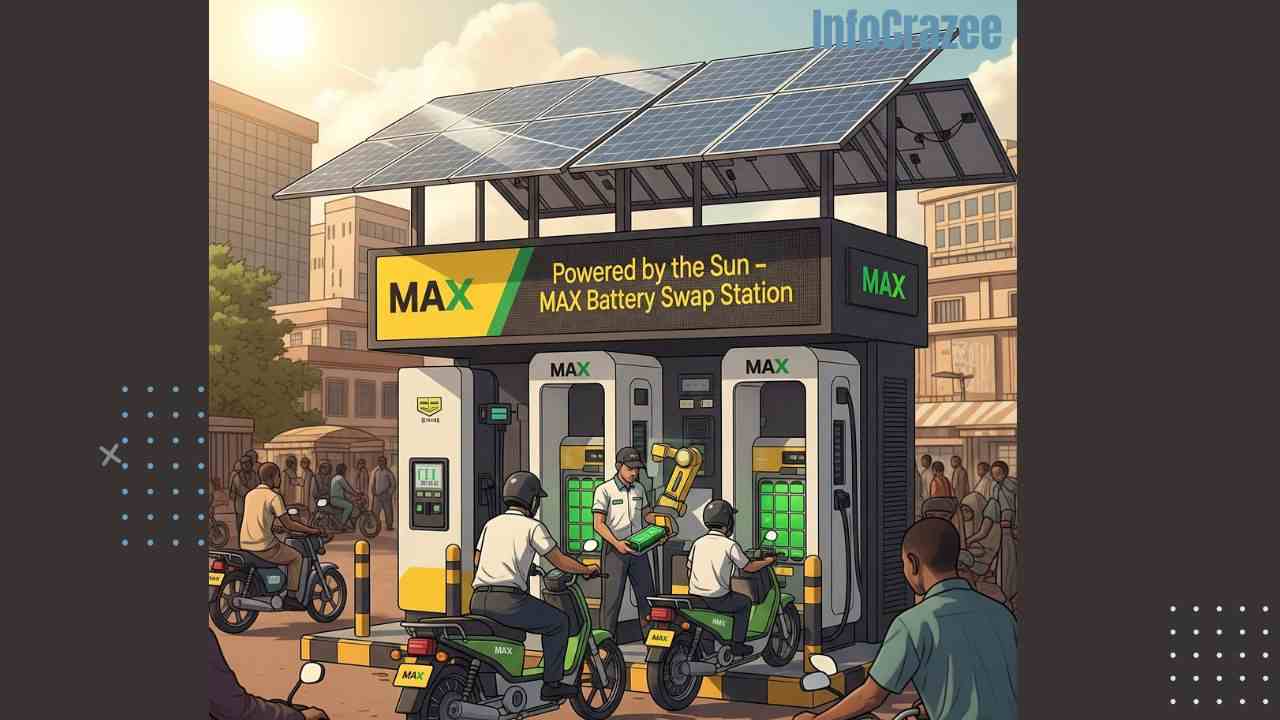MAX Unveils Nigeria’s First Solar-Powered Battery Swap Station
In a groundbreaking move for sustainable transportation, Nigerian electric mobility startup Metro Africa Xpress (MAX) has launched West Africa’s first solar-powered battery swap station in Lekki, Lagos. This innovative station, unveiled on July 30, 2025, marks a significant step toward a cleaner, more inclusive future for Nigeria’s gig economy and the broader African mobility landscape.
A Solar-Powered Solution for Riders
The new battery swap station runs entirely on renewable energy, powered by a 20kWp solar panel array, a 24kW inverter, and a 30kWh battery bank. This setup allows the station to provide uninterrupted, 24/7 battery swaps for electric vehicle (EV) riders, even after sundown or during cloudy weather, by storing excess solar energy. Riders can swap depleted batteries for fully charged ones in under three minutes, keeping delivery drivers, couriers, and other gig workers on the move without downtime.
“This isn’t just about clean energy—it’s about empowering people,” said Chinedu Azodoh, MAX’s Co-founder and President. “By using sunlight to power movement, we’re building a system where energy and transport work together to create jobs and economic resilience.” The station serves MAX’s network of EV riders, known as MAX Champions, and commercial partners, offering a reliable alternative to fuel-dependent vehicles.
Why It Matters
Nigeria’s transportation sector is heavily reliant on petrol-powered motorcycles, which contribute to carbon emissions and high fuel costs for gig workers. MAX’s solar-powered station tackles these challenges head-on, providing a zero-carbon solution that reduces operating costs and environmental impact. With Nigeria’s unreliable grid power affecting millions, the station’s off-grid design ensures consistent service, making clean mobility accessible even in areas with limited electricity.
The Lekki station is a pilot, but MAX has big plans. The company aims to roll out more solar-powered battery swap stations across Nigeria and other West African countries like Ghana and Cameroon in the coming months. This expansion aligns with MAX’s mission to formalize transportation and support Africa’s transition to a low-carbon future.
A Step Toward Inclusion
MAX’s initiative is about more than technology—it’s about people. The station supports Nigeria’s gig economy, where millions of delivery riders and small business owners rely on affordable, reliable transport. By offering quick battery swaps and eliminating fuel costs, MAX helps these workers save money and stay productive. “This is about dignity through uptime,” Azodoh said. “Riders don’t lose income waiting to charge.”
The project also reflects MAX’s commitment to local innovation. The company designs and assembles its electric motorcycles, like the MAXe-series, in Nigeria, tailoring them to the region’s rugged terrain and economic realities. With over 20,000 battery swaps already completed across its network, MAX is proving that clean mobility can scale in Africa.
The Bigger Picture
MAX’s launch comes amid growing momentum for electric vehicles in Nigeria. While another company, Qoray, claimed to introduce Nigeria’s first solar-powered battery swap station in Kano in May 2024, MAX’s Lekki station is recognized as West Africa’s first fully operational, scalable model, designed specifically for commercial EV ecosystems. Both efforts highlight Nigeria’s push toward sustainable transportation, supported by government ambitions for net-zero emissions by 2060.
As MAX expands its solar-powered infrastructure, it’s setting a precedent for how clean energy and mobility can transform lives. From reducing carbon footprints to empowering small businesses, this station is a bold step toward a future where Africa’s transportation is powered by the sun.






